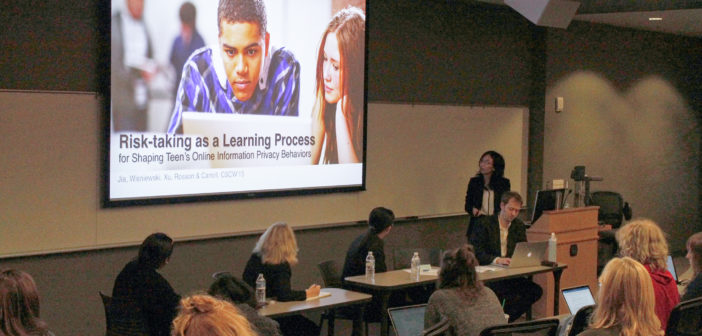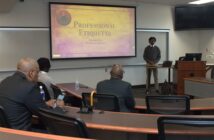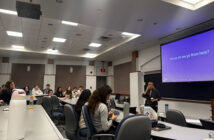From brick cell phones in ’90s sitcoms to the new face-detecting feature on the iPhone X, the norm for communication is constantly evolving. But with these advancements comes privacy concerns for users across the globe.
On Nov. 6, Lehigh students and faculty attended the fall Data X symposium, which addressed concerns regarding internet privacy and the prevalence of social media addiction today.
Heng Xu, the director of the privacy and analytics laboratory at Penn State, has worked on defining privacy and strategies to enhance the public’s control over personal online privacy.
Xu highlighted the idea that individuals are responsible for the privacy of their friends.
“Your friends may take these photos as part of the social memories,” Xu said. “Facebook makes these memories come alive. Just by that simple tagging action, this photo is immediately available for my friends, colleagues and students to see.”
One of Xu’s main strategies to combat this lack of privacy is to implement “social nudges” that keep members informed about data collection and use.
If these nudges become more of a social norm, Facebook users would be notified about the privacy risks that come with each post. However, Xu said Facebook’s business model is to get people to disclose more information, rather than less.
Another problem stemming from social media is how addictive the sites can be. Haiyan Jia, a professor in Lehigh’s department of journalism and communication, explained the addictive nature of social media.
“If you send out an update, (you expect your friends to) be liking and commenting on it,” Jia said. “You are the center of the world.”
Jia said when people only see the highlights of others’ lives, many individuals begin to compare their own lives to these highlights.
These addictive qualities and constant comparisons are what led Christian Wadsworth, ’18, to delete his Facebook.
“When I opened the web, my fingers would just type in Facebook, and then I’d wonder why I went on,” Wadsworth said. “People would be posting all these amazing things about their life, and then I’d feel bad about what I was doing.”
Brian Davison, a professor of computer science and engineering at Lehigh, recognized how privacy is defined differently today. He said the way people define privacy evolves as their surroundings and exposure to technology change.
“The understanding of privacy is changing,” Davison said. “People define privacy very differently than they defined it 20 years ago.”
Sarah Waldeck, a professor at Seton Hall Law, said oversharing information is unnecessary. For teenagers, knowing what exactly your friend had for dinner may seem normal, but to other generations, the easy availability of this information can seem strange.
“The thing that interests me is how much information there is and how little of it actually matters,” Waldeck said. ”I don’t even care where my own kids ate. I don’t need the photographic play-by-play of how it went down.”
However, the release of personal information allows for search engines like Google to enhance the user experience. Davison said the sacrifice of privacy translates into better service.
“Google is very good at what it does in part because it knows what you’ve done,” Davison said. “It has built a better service because of that.”
The definition of privacy is constantly changing, and with this change come concerns and improvements in quality of life.
“From a convenience perspective, it is remarkable,” Waldeck said. “Sometimes I do want to know where my kid ate dinner, and all I have to do is search their location on my phone.”






Comment policy
Comments posted to The Brown and White website are reviewed by a moderator before being approved. Incendiary speech or harassing language, including comments targeted at individuals, may be deemed unacceptable and not published. Spam and other soliciting will also be declined.
The Brown and White also reserves the right to not publish entirely anonymous comments.